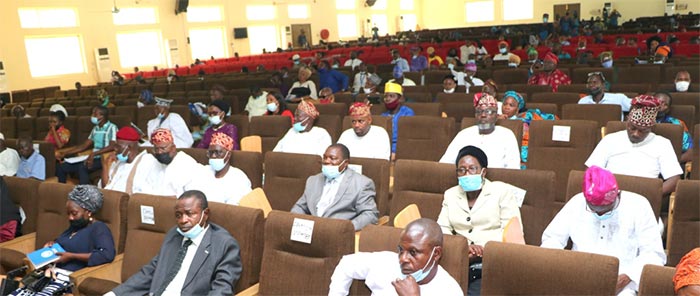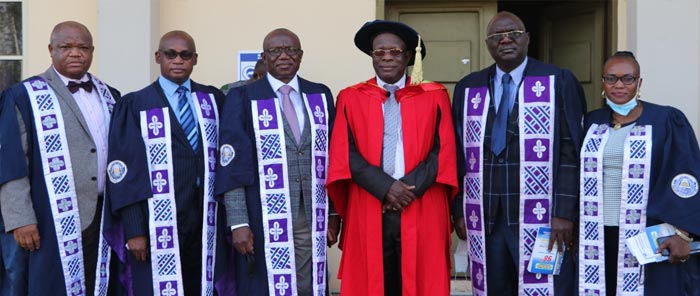A Professor of Solid State Physics and former Dean, Faculty of Science, Olabisi Onabanjo University (OOU), Ago-Iwoye, Prof. Rasaki Kolawole Odunaike, has charged the Federal Government to adopt renewable and alternative energy in driving Nigeria’s economy. He said apart from offering greater energy access and reduction in energy bills, renewable sources are also capable of promoting a rise in job creation in the country.
The don, who declared that the production of renewable energy locally can offer a viable alternative to the perennial epileptic power supply in Nigeria, submitted that renewable and alternative energy look set to be a large part of the future energy mix, along with other clean sources such as nuclear power. He expressed optimism that technological advancement with respect to the field of electronics will continue to improve the lives of the people in the fields of communication, medicine, basic sciences and engineering.
Prof. Odunaike made the declaration while delivering the 98th Inaugural Lecture of OOU on Tuesday, 12th October, 2021 at the Otunba Gbenga Daniel Lecture Theatre, Main Campus, Ago-Iwoye.
The Lecture entitled, “MY SCIENTIFIC INQUIRY INTO SOLID-STATE PHYSICS FOR SUSTAINABILITY” was presided over by the Vice-Chancellor, Professor Ganiyu Olatunji Olatunde.

At the event, the distinguished scholar posited that Nigeria must divest its power generation from thermal and hydropower sources and fossil fuels to green and clean energy generated from the sun, wind and tidal to drive the economy. He identified types of renewable and alternative energy to include solar, wind, hydro-electric, biomass, geothermal and tidal. He noted that since approximately 1.3 billion people around the world do not have access to grid electricity, technology advances have opened up a huge market for renewable and alternative energy, especially for solar power.
Prof. Odunaike pointed out that renewable and alternative energy projects in many developing countries have demonstrated that they can directly contribute to poverty reduction by providing the energy needed for creating businesses and employment. He said, “Renewable and Alternative Energies (RAE) are energies generated from unlimited/abundance natural resources.
Renewable or inexhaustible sources of energy are those on the earth, which are available in unlimited quantities and they are easily and always restored. Meaning that they are either available with no time limit or replenished more quickly than the rate at which they are consumed”.
Renewable and alternative energy sources are often associated with green energy and clean energy, but there are little differences between them.
Renewable energy sources are those that are recyclable, clean energy are those that do not release pollutants like carbon (IV) ”oxide (CO2) whereas green energy comes from natural sources.
“Though, this doesn’t mean that the energies aren’t harmful to the environment or have zero impact.
For example, some hydroelectric sources could damage natural habitats and cause deforestation. Nevertheless, they have a low environmental impact compared to fossil fuels. Therefore, not all renewable energy are fully clean or green”.
He further said, “Renewable energy gives a range of benefits including offering a freely available source of energy generation. As the sector grows there is bound to be a surge in job creation to develop and install the renewable energy solutions of tomorrow. Renewable sources also offer greater energy access in developing nations and can reduce energy bills too.’’ “Of course, one of the largest benefits of renewable energy is that much of it also count as green and clean energy.
This has created a growth in renewable energy, with wind and solar being particularly prevalent. However, these green benefits are not the sole preserve of renewable energy sources.

Prof. Charles Adekoya; the Inaugural Lecturer, Prof. Rasaki Kolawole Odunaike; (Academic), Prof. Ayodeji Agboola; Mrs. Ronke
According to Prof. Odunaike “Renewable and alternative energy look set to be a large part of the future energy mix, along with other clean sources such as nuclear power. The drive towards a greener future for power production is promoting a rise in job creation in renewable power industries such as solar and wind. This trend looks set to continue as governments strive to reach net zero.”
Odunaike further stated that “The solar energy is a free gift of nature to humankind, which is pollution free, can be sensed, controlled and used to produce power using solar cell modules,
Prof. Odunaike, who bemoaned the hazards of electronic wastes to the ecosystem, revealed that Physicists, Physical Chemists, Botanists, Engineers and others are working together to design and produce devices that are environmental friendly.
His words: “Electronic wastes (e-wastes) can be defined as electronic products and/or their components that have been used up and deserted. They contain electronic devices ranging from refrigerators, air conditioners, cell phones, personal stereos, to consumer electronics and computers which have been discarded by the users.
Also, these wastes involve both hazardous and nonhazardous forms which consist of ferrous and nonferrous metals, plastics, glass, wood and plywood, printed circuit boards (PCB), concrete and ceramics, rubber, and other items.’’
He further stated that “The hazard from e-waste cannot be overemphasized as it endangers the whole ecosystems and poses environmental health challenges to both human beings and other animals (aquaculture and fisheries, wildlife, etc.). Indiscriminate dumping and disposal of e-wastes on our lands prevented the lands from being used for agricultural purposes and these have posed a serious threat to the inhabitants. The water contents found in the area that harbored the e-wastes are not exempted from being contaminated by this indiscriminate dumping thereby endangering humanity by making the water unfit for domestic and agricultural purposes.” He, however, advocated proper disposal methods for materials that had been finally un-useable or fatigued.
The Inaugural Lecture had in attendance members of the University Management, distinguished scholars, traditional rulers and chiefs, eminent personalities, staff and students.

